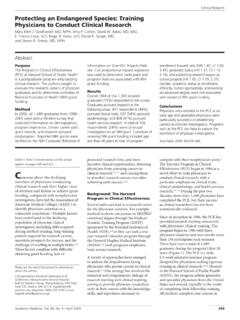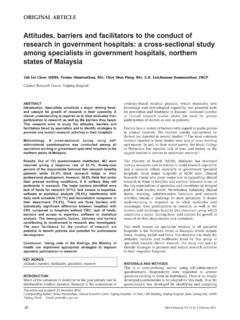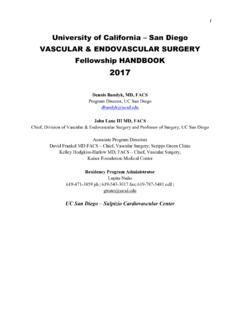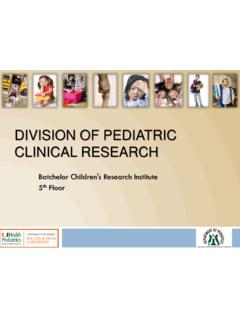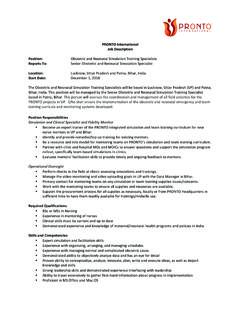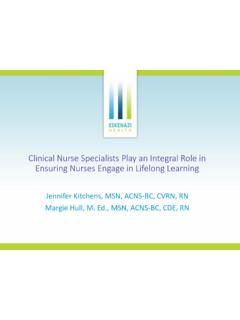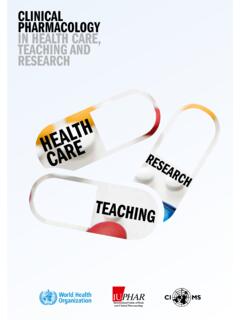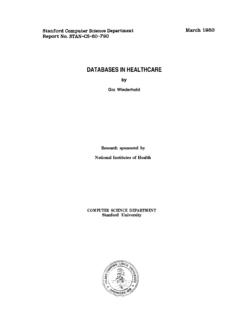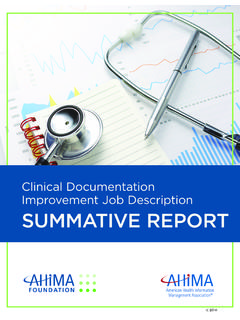Transcription of Recommended Standards for Training Specialists in ...
1 UEMS S-LM/MB 1/47 Section of laboratory medicine /Medical Biopathology Recommended Standards for Training Specialists in laboratory medicine /Medical Biopathology May 2012 UEMS S-LM/MB 2/47 Contents 1 Introduction 3 2 Contents of Training programmes 6 3 General Training programme 7 4 Overlap between specialties 10 5 Polyvalence versus monovalence 11 6 Recommended Regulations and Curricula for Training of Specialists in the different disciplines of laboratory medicine /Medical Biopathology in the EU 12 7 Logbooks for specialist Training in different disciplines of laboratory medicine /Medical Biopathology 23 Common Training 23 General laboratory medicine /Medical Biopathology 26 Specialisation in Monovalent Specialities 34 Syllabus in laboratory medicine - Clinical Chemistry 34 Syllabus in Clinical and laboratory Haematology and Transfusion medicine 36 Syllabus in Clinical and laboratory Immunology 39 Syllabus in laboratory Genetics (Genetic Pathology) 42 8 Fellowship 43 9 Continuing Professional Development 44 10 EACCME 45 11 Accreditation 46 12 Inspection of Training Centres 47 UEMS S-LM/MB 3/47 1 Introduction The European Union of Medical Specialists (UEMS) was founded in1958 and has since taken responsibility as a non-profit organisation aiming to promote the professional interests of medical Specialists .
2 The UEMS represents the interests of medical Specialists , and is actively working to harmonize Training and continuous medical education (CME) of its specialties and to promote the free movement of medical professionals within Europe. Today delegates from 36 EU states and observers of non-EU countries have been appointed officially by their National Bodies to work within UEMS (currently 30 full members, 4 associate members and 2 observers). UEMS operates a Secretariat in Brussels, which is governed by a Board, and a Council in which all National Medical Bodies are represented. The European Union has listed the recognized medical specialties within member states in its Directive 2005/36/EC of the European Parliament and the Council minutes of 7 September 2005 on the recognition of professional qualifications.
3 The Directive lists a diverse list of different specialties in the EU, which require harmonization. To deal with each specialty UEMS Sections and Boards were founded. These structures provided the framework for the development of specialties under the overarching supervision of UEMS. In each Section two delegates represent their country. Delegates to the Section elect a President of the Section, a President of the Board, a Vice President, a Secretary and Treasurer, and Conveners of Divisions according to specialties represented in the section. The UEMS Section of laboratory medicine /Medical Biopathology was founded in 1962 as the Section of laboratory medicine , which was considered an umbrella for all diagnostic- and laboratory -related specialties including Pathology (histopathology).
4 In 1988, histopathologists decided to form their own section. The Section laboratory medicine renamed itself to Medical Biopathology to cover the remaining diverse specialties and interests of doctors practising in either a single specialty (monovalent practice) or across multiple specialties (polyvalent practice). At present the Section has formed five divisions: General laboratory medicine /Polyvalent Medical Biopathology, laboratory medicine - Clinical Chemistry, Clinical and laboratory Haematology and Transfusion medicine , Clinical and laboratory Immunology, and laboratory Genetics (Genetic pathology) (New Division), according to the professional and scientific relations within each field of specialty. Recently, the name of the Section has been changed to: Section of laboratory medicine /Medical Biopathology The main activities of the Section, Board and Divisions focus on the harmonization of post-graduate education of medical doctors in laboratory medicine /Medical Biopathology, specialty Training , evaluation of continuing medical education (CME) programmes and conducting visitations of Training Centres.
5 In 1993 the UEMS published a Charter on the Training of Medical Specialists in the UEMS S-LM/MB 4/47 European Community. Based on this Charter, core curricula for Training in polyvalent and monovalent specialty have been laid down by the Divisions describing basic competencies, specialty competencies and clinical competencies in the different Specialties of laboratory medicine /Medical Biopathology. In 1999 the Section Medical Biopathology has published these Curricula in a Blue Book. In 2009 the Section and its Divisions decided to rewrite all Curricula and to publish these in 2012. Next to its activities to harmonize different curricula, the Board has created a Fellowship in laboratory medicine /Medical Biopathology, the role of which is complementary to national examinations where they exist. The European Board Examinations are regarded as a quality mark for safe independent practice at the end of the specialist Training .
6 Candidates who pass the UEMS S-LM/MB European Board Examination in laboratory medicine /Medical Biopathology and who are certified Specialists in an EU/UEMS member state can add "Fellow of the European Board of laboratory medicine /Medical Biopathology " ( ) to their name either in General laboratory medicine - Polyvalent Biopathology or one of the Monovalent Specialties ( laboratory medicine - Clinical Chemistry, Clinical and laboratory Haematology and Transfusion medicine , Clinical and laboratory Immunology, laboratory Genetics (Genetic Pathology)). The names of colleagues receiving the Fellowship are listed on our website. The Fellowship also acts to enhance the possibility of Specialists in laboratory medicine /Medical Biopathology to work in various European countries.
7 A further cornerstone of UEMS is EACCME, the European Accreditation Council for Continuing Medical Education (CME) and Continuing Professional Development (CPD). Organizers of medical congresses can via internet send in an application for approval to EACCME. If approved by the national medical society and by the appropriate section, board and division the congress will be approved by EACCME and participants will receive CME credits accordingly. The UEMS S-LM/MB Board has developed a Visitation Program through which Training facilities can be inspected and recognized using the Guidelines for the Recognition of Training Centres and Standards for Training of Specialists in laboratory medicine /Medical Biopathology as background for the visiting Specialists .
8 Lena Norlund Augusto Machado President of the Section President of the Board UEMS S-LM/MB 5/47 Section and Board of laboratory medicine /Medical Biopathology Executive officers President of Section Lena Norlund President of Board Augusto Machado Secretary Gerhard Zlabinger Treasurer Karin Magnussen Division General laboratory medicine /Polyvalent Medical Biopathology Chair Ludo Marcelis Delegates Manfred Boehm, Stelios Chatzipanagiotou, Claude Cohen, Montserrat Gonzal s Estecha, Gustav Kovac, Sophia Kyradij, George Kyriazis, Augusto Machado, Santiago Prieto Division laboratory medicine - Clinical Chemistry Chair Wytze Pier Oosterhuis Delegates Timo Kouri, Gabor Kovacs, Ilkka Mononen, Lena Norlund, Pat Twomey, Tomas Zima Division Clinical and laboratory Haematology and Transfusion medicine Chair Damiano Castelli Delegates Arnold Criel, Karin Magnussen, Vana Kokkinou, Antonio Robalo Nunes Division Clinical and laboratory Immunology Chair Siraj Misbah Delegates Iskra P.
9 Altankova, Gilbert Faure, Branko Malencia, Marigoula Varla-Leftherioti, Gerhard Zlabinger Division laboratory Genetics (Genetic Pathology) Chair Ian Frayling UEMS S-LM/MB 6/47 2 Content of the Training Programmes In the following pages the European Board of laboratory medicine /Medical Biopathology describes the contents of the Training Programme of the various specialties of Medical Biopathology. The curricula will be updated regularly on our section s homepage, , since progress in laboratory medicine /Medical Biopathology, as in all areas of medicine , is occurring at a very rapid rate. It should be remembered that it is the responsibility of both the Trainee and the Supervisor to ensure that all recent advances are included in the Training programme, and that each Training programme should be designed around each individual trainee s background knowledge and skills at commencement of Training .
10 Not all hospitals will have all the facilities and expertise required to provide a full Training programme, so many trainees will have to rotate between departments to obtain comprehensive Training . The European Board of laboratory medicine /Medical Biopathology supports the idea of rotations within European countries and also between countries associated with the UEMS. In the laboratories of the future, more specialised knowledge in many areas will be needed. The importance of physicians in the laboratory increases with the rapid growth of new medical knowledge. Firstly, medical doctors in the laboratory bring with them a specific set of skills that enables effective clinical liaison with other doctors in a hospital or in primary care. Secondly, laboratory physicians, independent of specialty, possess a common set of knowledge and skills, which ensures that laboratories under their direction remain clinically responsive.
